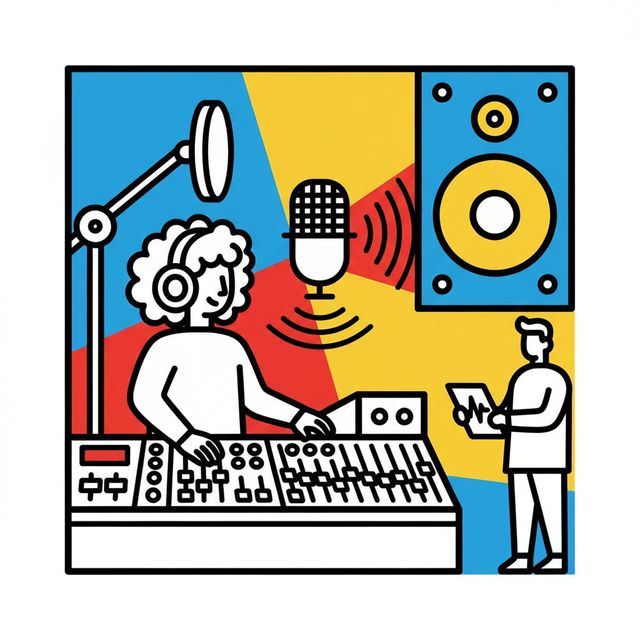Audio Engineering
Audio engineering is a vast and complex field encompassing various technical and creative aspects of sound recording, manipulation, and processing. With the proliferation of digital audio technology, audio engineering has become a key component in myriad domains, including music production, film and television, video games, and virtual reality.
Why Study Audio Engineering?
Individuals may choose to pursue audio engineering for various reasons. Some may be driven by a passion for music and a desire to delve into the technical aspects of sound production. Others may seek to enhance their academic qualifications, particularly those in fields like music technology, computer science, or audio engineering. Moreover, audio engineering skills are highly sought after in the professional realm, making it a lucrative career path for those with the necessary qualifications and experience.
Skills Gained from Online Courses
Online courses provide a flexible and accessible way to acquire audio engineering knowledge and skills. These courses typically cover a wide range of topics, including:
- Digital audio fundamentals
- Signal processing and audio effects
- Music production techniques
- Sound recording and mixing
- Audio software and hardware
By enrolling in these online courses, learners can gain a solid foundation in audio engineering principles, develop practical skills, and acquire industry-specific knowledge.
Audio Engineering in Practice
Audio engineers perform a diverse range of tasks, depending on their specialization and the industry they work in. Some common responsibilities include:
- Recording and mixing audio tracks for music, film, television, and video games
- Designing and implementing sound effects and soundtracks
- Optimizing audio systems for live performances, recording studios, and other venues
- Troubleshooting and resolving technical issues related to audio equipment and software
Audio engineers work closely with musicians, producers, directors, and other professionals to achieve the desired sonic results.
Benefits of Learning Audio Engineering
Acquiring knowledge and skills in audio engineering offers numerous benefits:
- Enhanced Creativity: Audio engineering empowers individuals to express their creativity through the manipulation of sound.
- Career Opportunities: Audio engineering is a growing field with job opportunities in various industries, including music, film, television, and gaming.
- Technical Proficiency: Audio engineering involves working with specialized software, hardware, and techniques, fostering technical proficiency and problem-solving skills.
Projects and Activities
To deepen their understanding of audio engineering, learners may engage in various projects and activities, such as:
- Recording and mixing their own music
- Creating sound effects and soundtracks for short films or video games
- Building a home recording studio
- Attending live concerts or recording sessions to observe audio engineering techniques
These hands-on experiences provide valuable practical insights and enhance overall learning.
Personality Traits and Interests
Individuals interested in audio engineering typically possess certain personality traits and interests:
- Musical Aptitude: A musical ear and an understanding of music theory are beneficial.
- Technical Proficiency: An affinity for technology, electronics, and problem-solving is essential.
- Creativity: Audio engineering requires a creative mindset to manipulate and shape sound.
- Attention to Detail: Patience and meticulous attention to detail are crucial for achieving high-quality results.
Employer Perspective
Employers value audio engineers who possess a combination of technical skills, creativity, and a strong work ethic. In addition to the core technical abilities, employers also seek individuals with:
- Communication Skills: Effective communication is essential for collaborating with musicians, producers, and other team members.
- Teamwork and Collaboration: Audio engineers often work in collaborative environments, requiring strong teamwork skills.
- Problem-Solving Abilities: Troubleshooting audio issues and finding creative solutions is a key aspect of the role.
- Continuous Learning Mindset: The audio engineering field is constantly evolving, so a willingness to learn and adapt is highly valued.
Online Courses and Hands-On Learning
While online courses provide a solid foundation, they are most effective when complemented with hands-on learning experiences. Practical application through projects, internships, or volunteering opportunities allows learners to develop their skills and gain invaluable real-world experience.
Conclusion
Audio engineering encompasses various skills and knowledge, from technical fundamentals to creative expression. Online courses offer a flexible and accessible way to acquire these skills. However, it is important to remember that hands-on learning is crucial for a comprehensive understanding of the field. By combining online learning with practical experiences, individuals can develop the necessary expertise to pursue fulfilling careers in audio engineering.


